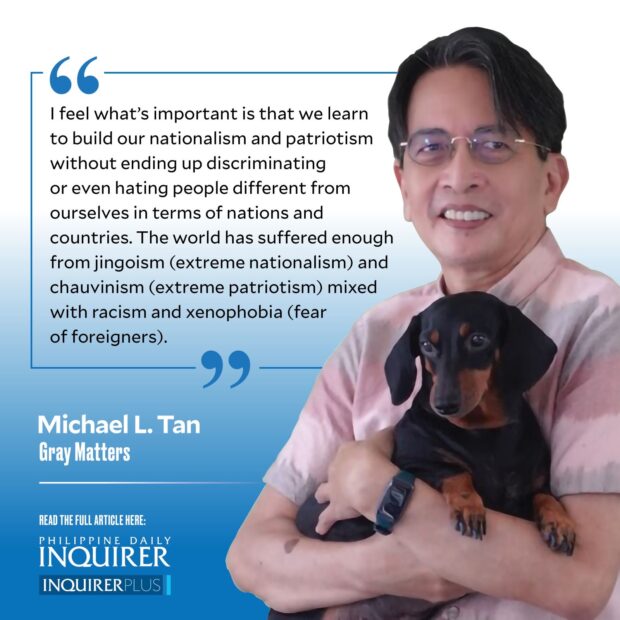Nationalism, patriotism
 The controversies around the Department of Tourism’s “Love the Philippines” promotional campaign got me thinking of another related controversy on an international scale.
The controversies around the Department of Tourism’s “Love the Philippines” promotional campaign got me thinking of another related controversy on an international scale.
I’m referring to the terms “nationalism” and “patriotism,” both generally positive terms that were even taught in schools and upheld as cherished values, but which have now taken on negative meanings.
I’ll concentrate on English but similar growing reservations about the two terms are to be found in other languages. The definitions I will be using are from American political scientist Joshua Holzer in a recent article he wrote for The Conversation.
The original meanings of the two words deal with loyalty and love. With nationalism, loyalty and love are directed to the nation, defined by Holzer as “a group of people who share a history, culture, language, religion, or some combination thereof.”
Patriotism, on the other hand, is directed toward a country or a state, defined by Holzer as an “area of land that has its own government.”
The tensions come about when you have a country composed of different nations, defined by ethnicity, language, or religion. For example, you have the Catalonians in Spain, who have been fighting for a separate state for decades. Or you have French-speaking Canadians talking about a Québécois nation.
The United States is currently characterized by extreme nationalism, notably white nationalism, where whites are reacting to immigrants and people of color. White nationalists are often white supremacists as well, thinking of themselves as superior to other “races.”
The term “white,” as with race, is a self-ascribed identity. One of the most rabid self-proclaimed white nationalists in the US, Nick Fuentes, is of Mexican descent. His white nationalism includes anti-semitism, perceiving Jews as non-white. He also proclaims himself as a Catholic integralist and Christian nationalist, opposed to non-Christians in general.
China distinguishes patriotism, which in Chinese comes out as “loving your country ideology” (aiguo zhuyi), and nationalism, which is “nationality ideology” (minzu zhuyi). The Chinese feel very threatened by nationalism from groups like the Muslim Uighur and Buddhist Tibetans, with their secessionist movements.
The Philippines’ main threat from secessionism comes from the Moro of Mindanao, who have succeeded to carve out a Bangsamoro Autonomous Region in Muslim Mindanao, similar to the Cordillera Administrative Region in the north.
The Philippines is a good example of a country with ambivalent feelings around nationalism. I grew up with elders warning about “makabayan” groups, particularly fearful of the Kabataang Makabayan (KM), translated as Nationalist Youth. In Filipino, “makabayan” is used for both nationalism and patriotism. KM members saw themselves as loving the Philippines. Conservatives saw KM as being mainly anti-American, and well into the end of the 20th century, there were still many Filipinos who could not understand why anyone could not love Mother America.
As for being makabayan in the sense of patriotism, a love for the Philippines, we remain hobbled by our regional identity (e.g., being Ilokano, Kapamapangan, or other ethnicities) far more powerful and binding than being Filipino.
Filipinos also find themselves increasingly challenged in their loyalties because of our diaspora, being dispersed throughout the world and settling down. With the Philippines allowing dual citizenship, you will find many Filipinos who are nationalistic in the sense of still loving the Philippines because of their origins, while patriotically singing “The Star-Spangled Banner” for the United States or “God Save the King” (until last year, “God Save the Queen”) for the United Kingdom.
I feel what’s important is that we learn to build our nationalism and patriotism without ending up discriminating or even hating people different from ourselves in terms of nations and countries. The world has suffered enough from jingoism (extreme nationalism) and chauvinism (extreme patriotism) mixed with racism and xenophobia (fear of foreigners).
The Philippines is a relatively young country, encumbered by long periods of colonialism. It will take time to build a sense of Filipino, especially when complicated by our other loyalties around ethnicities, languages, and religion.
Might we build our patriotism around that of “home,” defined by the cliché, the home being where the heart is?
mtan@inquirer.com.ph




















